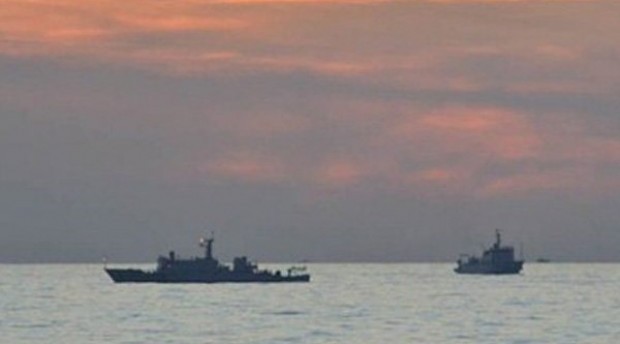
This undated handout photo taken by the Philippine Navy and released April 11, 2012, by the Department of Foreign Affairs shows Chinese surveillance ships off Panatag (Scarborough) Shoal. Armed Forces Chief of Staff Gen. Emmanuel Bautista on Monday, Feb. 24, 2014, accused China’s Coast Guard of firing water cannon at Filipino fishermen last month to drive them away from Panatag Shoal in the West Philippine Sea. AFP FILE PHOTO/DFA/PN
DAVAO CITY, Philippines—When President Duterte meets with officials of China, he will insist that discussions between the two countries on the South China Sea be based on the arbitral tribunal ruling in The Hague in July that invalidated Beijing’s claim to the sea areas falling within its “nine-dash-line.”
Mr. Duterte emphasized his point yesterday as he expressed concern about reports of barges coming in that could indicate new construction activity at Panatag Shoal, also known as Scarborough Shoal, off the coast of Zambales province.
China has been embarking on massive land reclamation in the disputed areas, and experts fear that the facilities it has built could be used for military purposes.
In a speech at the inauguration of the Davao International Container Port on Friday, Mr. Duterte disclosed that he found it “unsettling” to read intelligence reports that there were a lot of barges at the Panatag Shoal area.
“What is the purpose of a barge? You put something there and bring it somewhere usually. I think they are starting in [Panatag Shoal] and this would be another ruckus there,” he said.
But he said he did not intend to raise the territorial dispute between the Philippines and China at the meeting of the Association of Southeast Asian Nations (Asean) in Laos next week.
“I have nothing against China now. I do not intend to raise the issue before the Asean because if I do, there’s going to be a convoluted thing there, to each his own,” he said.
He said the territorial dispute was “just an issue between the Philippines and China” and talking about it at the Asean meeting will just make “clutters.”
He said dealing with China, which refuses to honor the arbitral ruling, was all about “timing.”
“I’m sure, as your President, I would not lead you to trouble, or I would not cause you shame. There will be a time when I have to make a stand and I have to make it clear to China, ‘You know every time you talk about sole ownership or even entitlements there, it’s something which is totally unacceptable to us,’” he said.
Duterte said he was proceeding with the right drift as he did want any trouble with China.
“We want to trade, do commerce with everybody. We have plenty to sell, plenty to ship. I hope that there would not be a time that we have to make crucial decisions in our national life,” he said.
In an interview after his speech, Mr. Duterte said he planned to ask the Chinese ambassador if there was any ongoing construction or expansion in the South China Sea, and if the Philippines still had fishing rights in the disputed areas, which he said was really the “entitlement” of the country since it won the arbitral tribunal case.
Meanwhile, Southeast Asian countries and China will establish hotlines and adopt communication protocols to avoid potential naval clashes in the disputed South China Sea, Foreign Assistant Secretary Helen de la Vega told a news conference on Friday.
The protocols will be signed in Laos next week, when heads of the 10-member Asean meet with leaders from other regional powers—China, Japan, South Korea, Australia, India, Russia and the United States—for a three day summit.
The mechanism, called the Code for Unplanned Encounters at Sea, would be new for both Asean and China, De la Vega said.
“It’s one way of deescalating tensions in the South China Sea,” she said, adding that hotlines between China and the Asean governments would be established.

